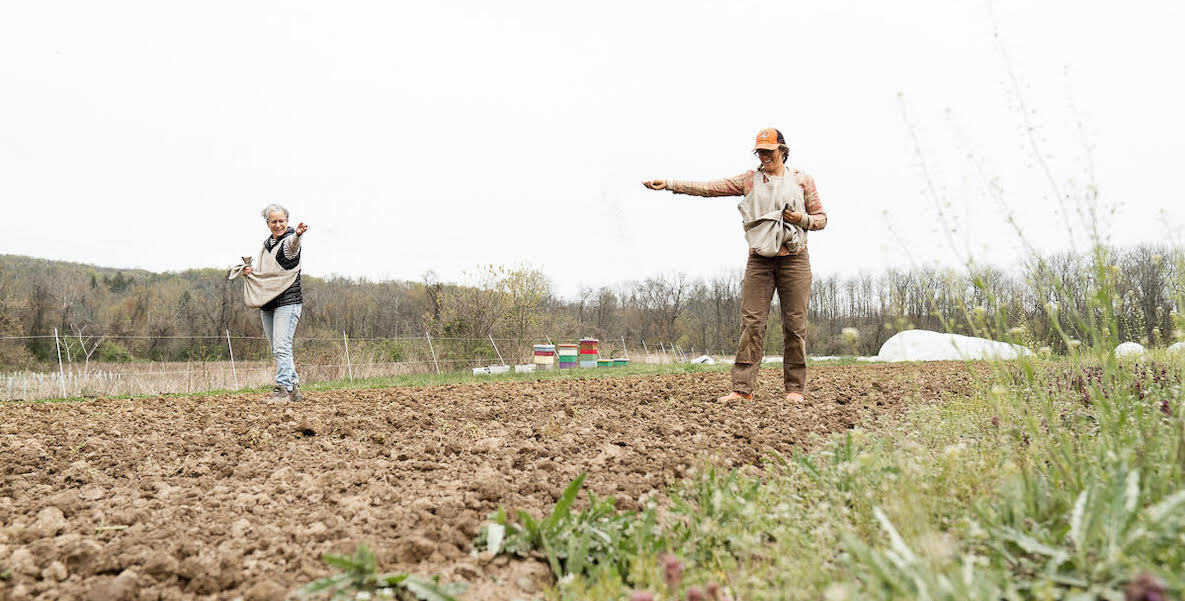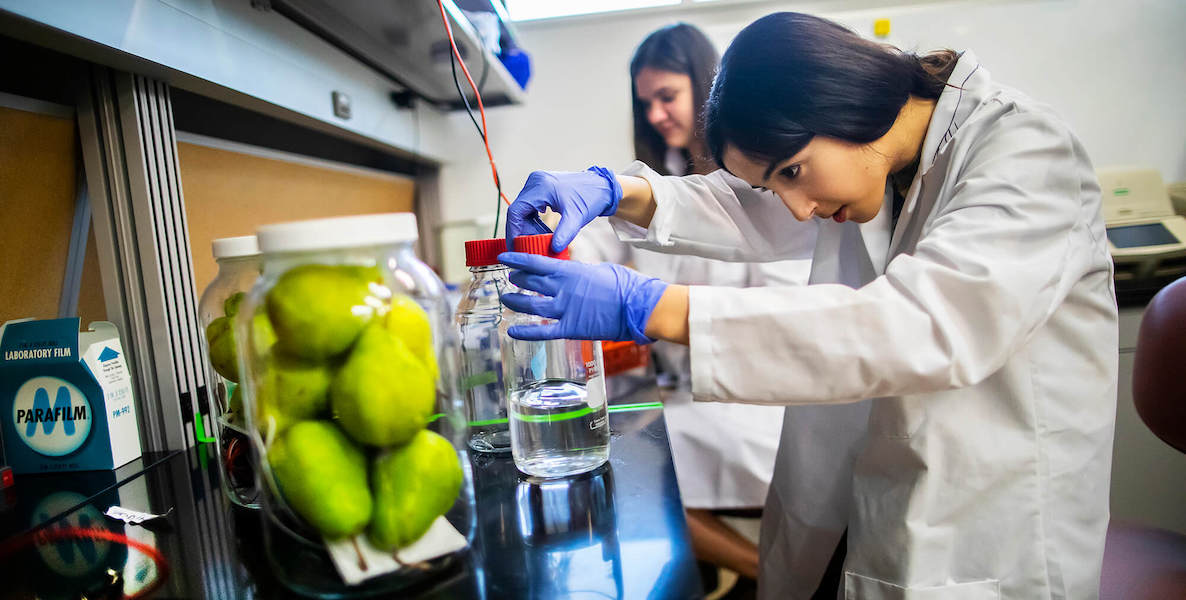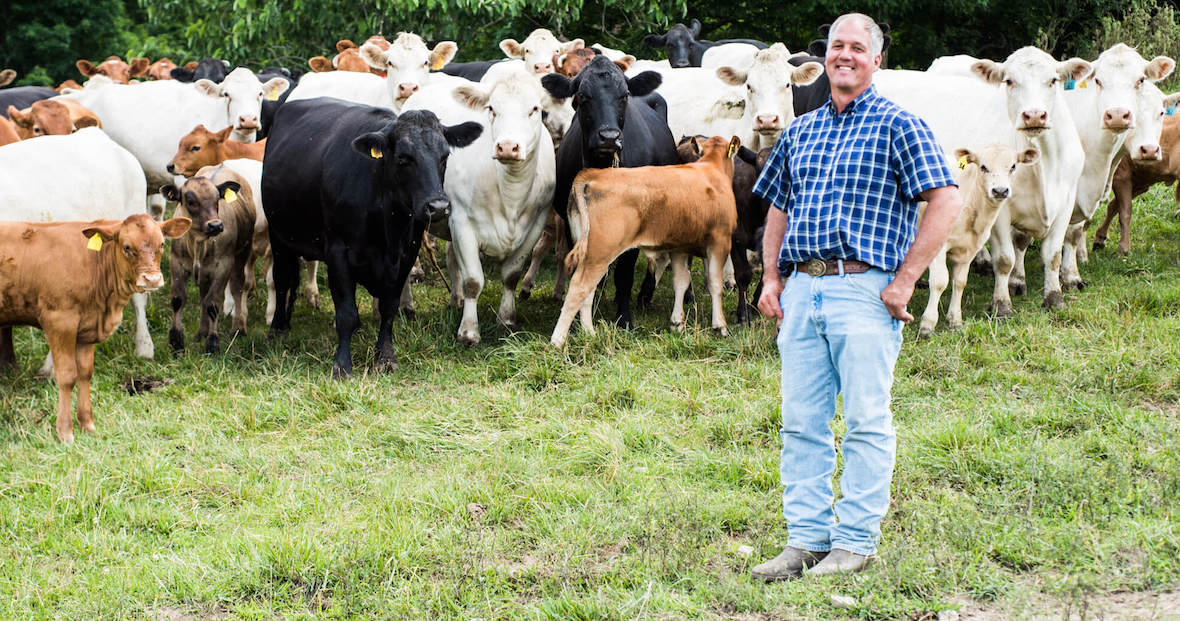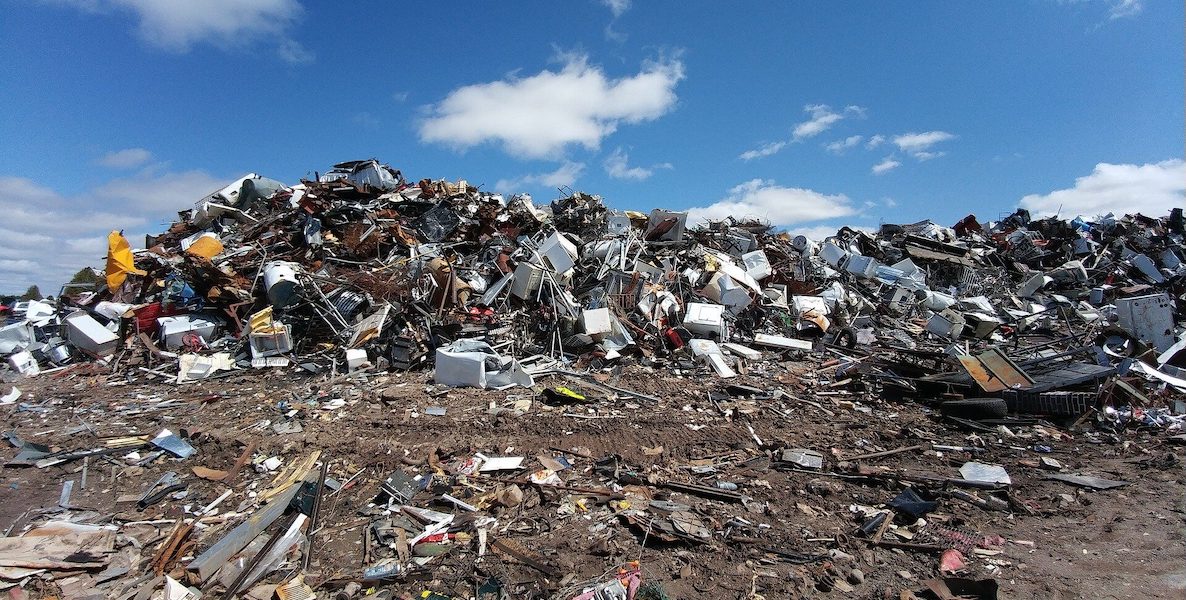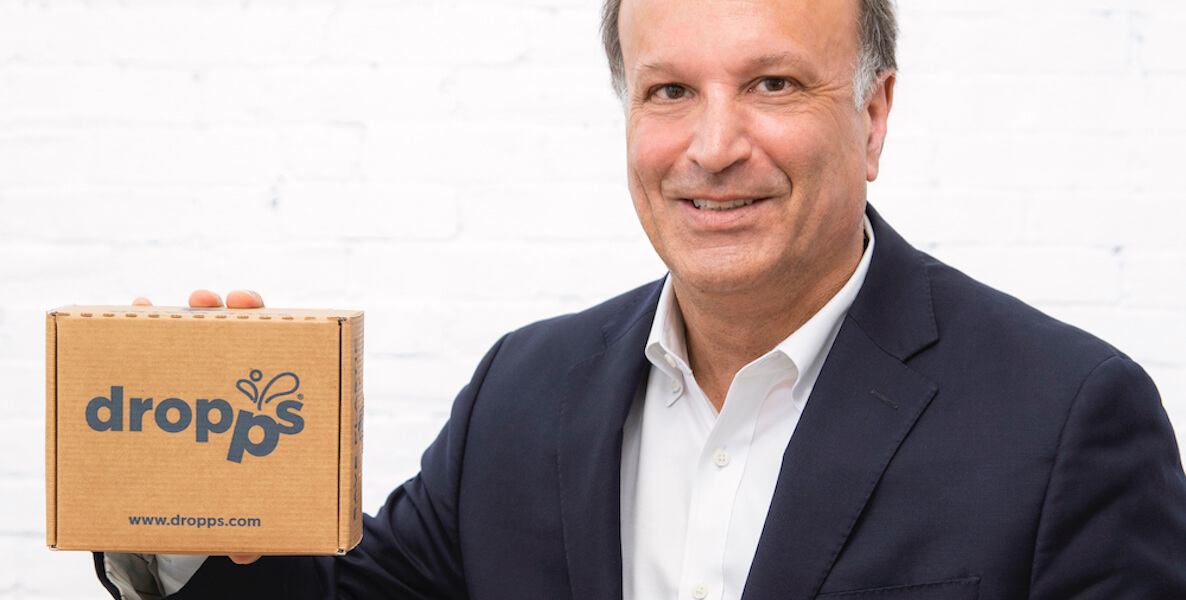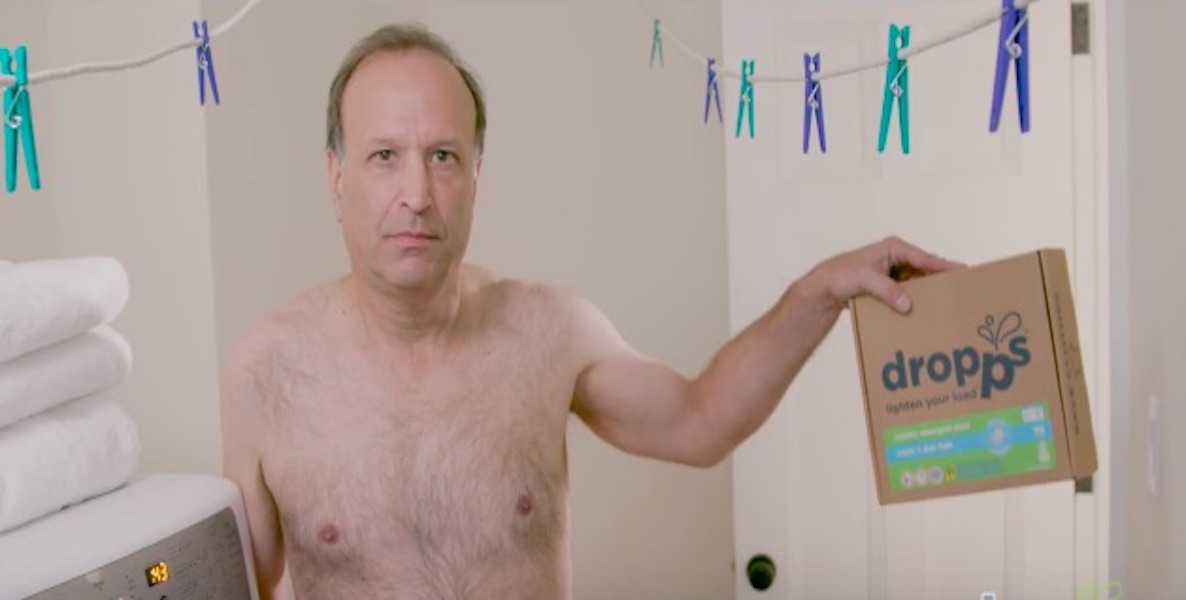Philadelphia entrepreneur and textile engineer Jonathan Propper guides all of his ventures, personal and professional, with one saying: “Elevate the core, eliminate the stupid.”
It’s a mantra he adopted long before launching Dropps, his eco-friendly laundry detergent company in 2005. His mother, Lenore Propper Schwartz, instilled this idea in him back in the 1980s, when they owned the cotton-spinning business Conshohocken Cotton Company together.
Unable to find a detergent gentle enough for the sweaters they made, Propper Schwartz and her son developed a detergent product specifically for washing cotton. Their second company, a precursor to Dropps called Cot’nwash, was born and Propper Schwartz, who felt it was “stupid” to ship water around, sold it as a powdered detergent directly with the cotton sweaters it was meant to wash, Propper says.
“My mother had the thought, Why ship water around when there’s water in the washer?” Propper says. “We want to just deliver to the consumer what is going to get their clothes clean and make them last a long time.”
Though they sold both Cot’nwash and the Conshohocken Cotton Company, Propper remained focused on perfecting the core, cleaning elements of laundry and detergent products and eliminating anything that didn’t add value, including dyes that add color, plastic packaging and other elements that made laundry detergent unsustainable. He ended up creating colorless, plant-based laundry detergent pods—Dropps’ flagship product.
Now in its 15th year, Dropps has seen 15 straight quarters of growth, received recognition from the EPA as one of their 2017 Safer Partner Choice of the Year Award winners, and expanded into other products, like fabric softeners, dishwasher detergents and laundry bags and dryer balls.
In February, it received $10 million in funding from the London-based alternative venture capital firm The Craftory, and in August they were ranked as Philadelphia’s fastest growing company by Inc. Magazine.
![]() “Just trying to solve everyday household problems for the consumer has helped grow the business,” Propper says. “Current customers are buying more products, and we’re adding more customers, so that combination has contributed to the strong growth.”
“Just trying to solve everyday household problems for the consumer has helped grow the business,” Propper says. “Current customers are buying more products, and we’re adding more customers, so that combination has contributed to the strong growth.”
Solving everyday household problems was part of how Dropps got its start. Propper started developing the product while still working at Cot’nwash when his then-wife Nina Swift grew frustrated with measuring out different types of liquid detergents. Borrowing technology from the soluble plastics and polymers used by custodians, Propper developed a one-size-fits-all laundry detergent pod that consumers could just toss in the machine.
“There’s this saying: if you love what you do, you never work a day in your life. And if what you’re doing, on the next level, has a purpose to it, it just makes it that much better,” Propper says.
Competing With Big Laundry
While Tide may be infamous for selling similar pods, Propper’s were actually developed first. He patented and began selling Dropps’ pods in 2005, seven years before Tide Pods hit the shelves in 2012.
But Propper soon found himself being pushed out of retail shelves in favor of what he calls “big laundry” brands. His products were pushed to the top and bottom shelves, while Tide occupied the coveted middle shelf, moving Dropps away from consumer eye, and more importantly hand level.
![]() “What we realized was that the retail distribution channel is heavily rigged,” Propper says. “For that person walking down the aisle or driving a cart down the aisle it’s the middle of the shelf where they can reach out and just grab a product. But big laundry will take their products out of stores if they put us on that shelf.”
“What we realized was that the retail distribution channel is heavily rigged,” Propper says. “For that person walking down the aisle or driving a cart down the aisle it’s the middle of the shelf where they can reach out and just grab a product. But big laundry will take their products out of stores if they put us on that shelf.”
Rather than fight for shelf space, Propper started transitioning to online, direct-to-consumer sales in 2012. By 2017, Dropps was out of all retail stores. Their website now boasts a subscription service, similar to those like Dollar Shave Club.
They market the product directly to customers using ads that are made to go viral, including one where a shirtless Propper explains the “naked truth” about Dropps while posing shirtless in a bathtub.
These wacky advertising tactics may draw people in, but Propper says that it’s the products’ sustainability that makes them long-term customers.
The Environmental Impact
On the whole, washing and drying clothes has an enormous environmental impact. Washing and drying laundry accounts for 66 percent of the solid waste and over half of the air emissions generated by the fashion industry, according to the book Sustainable Fashion and Textiles: Design Journeys.
Detergent, however, can be bad for the planet even before it hits the spin cycle. Often packaged in plastic bottles, waste from laundry detergent can live for years in landfills.
“For something that you need all the time and use every day, why should it come in the package that’s going to last a lifetime in the landfill?” Propper says.
Rather than using plastic bottles or tubs that never degrade, Dropps packages its products in recyclable cardboard boxes with child-safety latches that keep children from ingesting the pods. The pods are made from plant-based ingredients with no phosphates or chlorine and the company doesn’t test its products on animals.
Even more than creating a sustainable product, Dropps makes it easy for consumers to transition to an environmentally sustainable detergent. The subscription service means that customers don’t even have to think about ordering the product. It just shows up whenever they need more. All they have to do is toss the pods in the washing machine and the box in a recycling bin and already they’ve reduced their carbon footprint.
“The consumer has what I call today ‘SAD’ and SAD is sustainability anxiety disorder,” Propper says. “We all want to do the right thing, but we’re confronted with the difficulty in doing it … We just make it easier to make their contribution without having to do anything. We’ve done all the work for you.”
Sustainability, which is at the heart of the company’s mission, is also a personal issue for Propper who attended Philadelphia’s first Earth Day events almost 50 years ago.
“I can admit I was at the first Earth Day on Belmont Hill in Philadelphia. Philadelphia was a big city for that initial Earth Day and Earth Week,” Propper says. “There’s this saying: If you love what you do, you never work a day in your life. And if what you’re doing, on the next level, has a purpose to it, it just makes it that much better.”
In the Venture Capital Space
Their determination to disrupt the laundry detergent business by creating sustainable, user-centric products is what attracted the alternative venture capital firm The Craftory to the company, which sites Dropps’ rapid growth over the last few years as a sign that consumers are clamoring for more sustainable laundry products.
![]() “Laundry care is a giant category that’s cosily been ruled by a handful of corporate behemoths for over a century, bedazzling consumers with ever more nonsensical claims of ‘washes whiter,’ enabled by ever less-sustainable chemicals and plastics,” Ernesto Schmitt, co-founder and arch crafter at The Craftory, says. “It’s been crying out for a challenger to call out the nonsense consumers are being fed, and to offer a straight-talking, natural and plastic-free alternative. That’s exactly what Dropps is.”
“Laundry care is a giant category that’s cosily been ruled by a handful of corporate behemoths for over a century, bedazzling consumers with ever more nonsensical claims of ‘washes whiter,’ enabled by ever less-sustainable chemicals and plastics,” Ernesto Schmitt, co-founder and arch crafter at The Craftory, says. “It’s been crying out for a challenger to call out the nonsense consumers are being fed, and to offer a straight-talking, natural and plastic-free alternative. That’s exactly what Dropps is.”
In the venture capital space, The Craftory is disrupting the business world by making permanent investments in companies that aren’t tied to a specific time frame for returns. They also invest as common shareholders rather than taking preferred equity and only finance consumer packaged goods companies that strive to make change in the world.
By investing as common shareholders, The Craftory sees returns after other expenses, such as those to creditors, bondholders and preferred equity holders, have been paid. This type of investment is riskier, but it shows that The Craftory is committed to being a long-term partner for Dropps.
“The consumer has what I call today ‘SAD’ and SAD is sustainability anxiety disorder,” Propper says. “We all want to do the right thing, but we’re confronted with the difficulty in doing it We just make it easier to make their contribution without having to do anything. We’ve done all the work for you.”
“They’re a disruptor in the financial category, if you will, and so I guess they look for another disruptor in another category,” Propper says.
Their $10 million investment has already been put to use. Just prior to the pandemic, Dropps moved into a larger manufacturing and distribution space in Chicago. Prior to the move, Dropps was using two smaller spaces in the Windy City. The move to the larger space has allowed for easier social distancing.
“We have a saying that safety is first, quality second and production third,” Propper says. “In Covid, safety becomes even bigger.”
They also plan to use the money to increase the size of their 35-person team as the Logan Square-headquartered company has continued to see rapid growth during the pandemic. As people stay home more, they are cooking more frequently which means more dishes and thus more detergent.
Specifically, Propper wants to add more people to Dropps’ branding and growth marketing and product innovation and technology teams.
“It’s really an investment in people,” Propper says. “A lot of that money was taken to invest in people and build out a stronger team and to compliment some of the skills that are in the company already, in the core.”
As the company continues to grow, Propper wants to focus on elevating the core of the product and continuing to eliminate “the stupid.” Their next step will be eliminating labels from all of their packaging. Instead, they’ve purchased a printing press and will print product information directly on the boxes.
Labels, Propper believes, are just more unnecessary waste that can be eliminated by printing them directly on the recyclable boxes.
“It’s an example of how sustainability and cost are not mutually exclusive. There’s a cost of the label and then there’s the cost of putting that label on,” he says. “If you can live the life you want to lead but do it in a more sustainable way, which is more convenient, we’re going to do it.”
Header photo: Dropps founder Jonathan Propper


